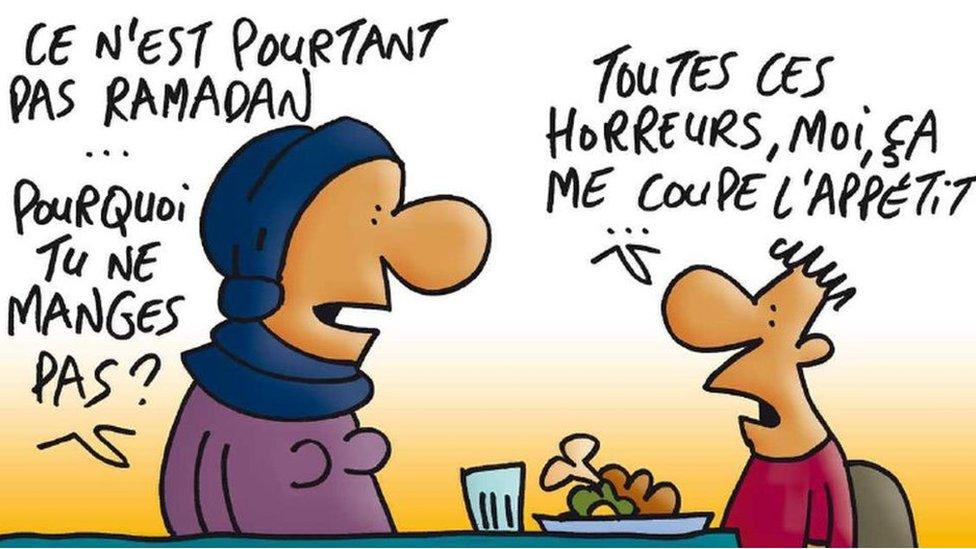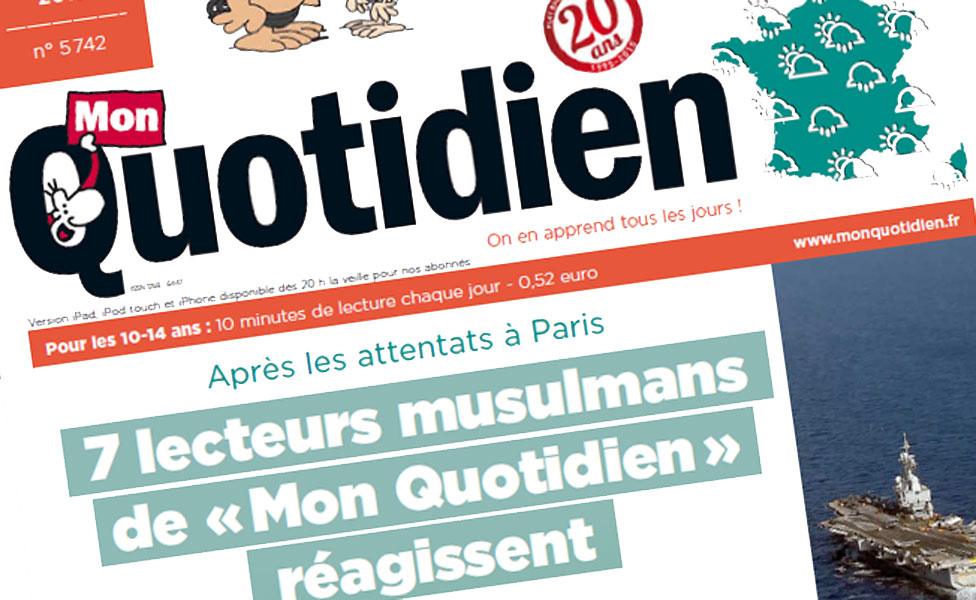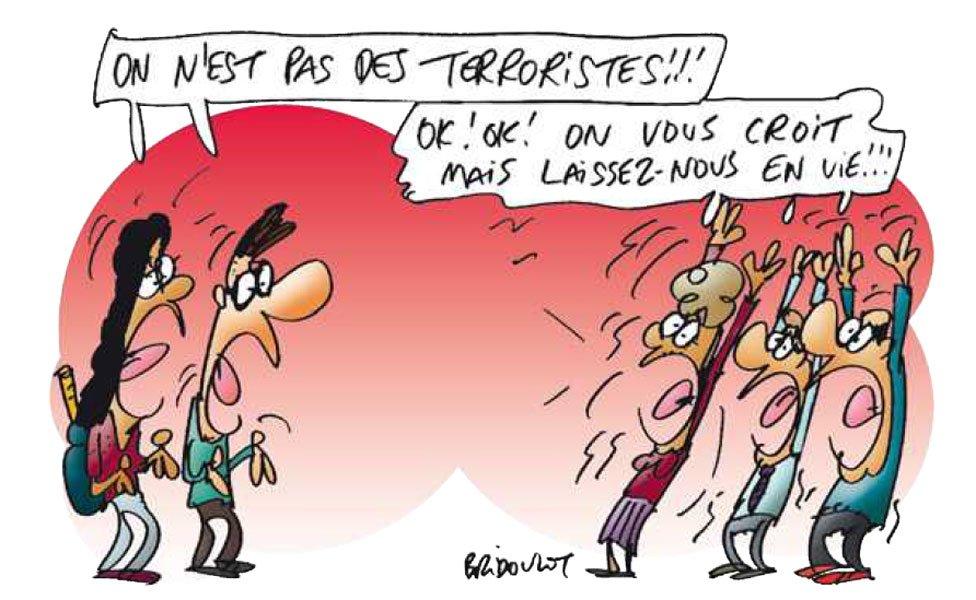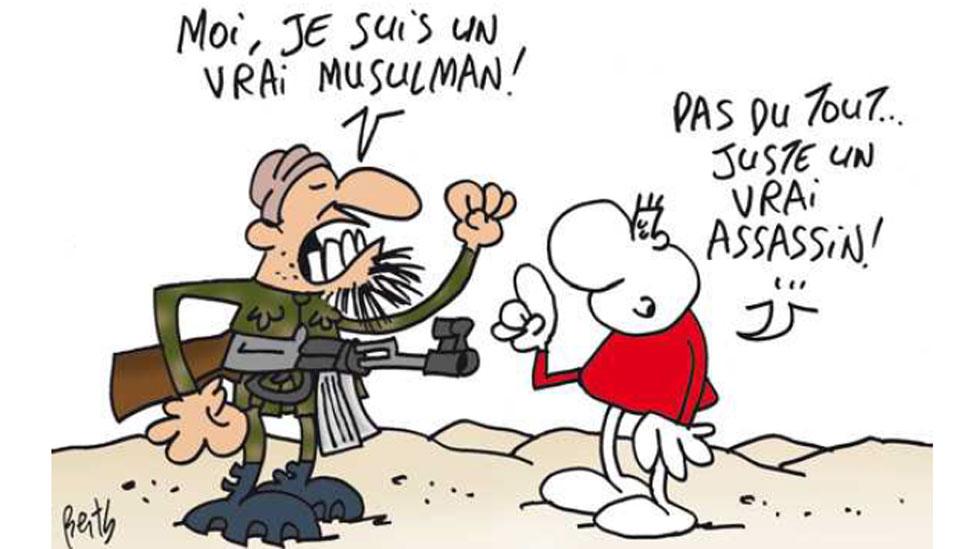How the Paris attacks are affecting Muslim children
- Published

"It's not Ramadan yet, why aren't you eating your food?" asks the mother. "All these horrors are ruining my appetite," the child replies.
Many parents have found it hard to talk to their children about the Paris attacks in which 130 people were killed - but it has been particularly difficult for Muslim families. With that in mind, a daily children's newspaper is devoting Tuesday's pages to its young Muslim readers.
"When I arrived at school last Monday, some friends treated me like a terrorist," says nine-year-old Ayman. "I spoke to my teacher. She explained to my classmates that being a Muslim does not make you a terrorist."
"I was shocked, I spoke to my mum about it. I was afraid, afraid that they [terrorists] are coming to my city too," says Mohamed, who is also nine.
Both were speaking to the French newspaper for six-to-10-year-olds, Le Petit Quotidien, external. After the attacks, the paper and its sister editions for older children, Mon Quotidien and l'actu, dedicated four days to explaining what had happened and answering readers' questions.

"We got praised by parents and teachers saying, 'We really needed your words to be able to explain such an unexplainable things to our kids,'" says editor Francois Dufour. But he received about 10 letters that were not so congratulatory.
"They were from Muslim parents," he says. They told him, "You cannot write that those guys [the attackers] are Muslims because they are not Muslims, they are just using Islam. Some of us believe in the strict application of Islam and that doesn't make us terrorists."
So he launched an appeal for Muslims readers to get in touch to share their feelings and experiences over the past 10 days. "It was not easy to convince them to talk," he says. Those who did, revealed they were "frightened, astonished and disgusted - even more so if they are Muslim because they are disgusted that some guys are using their religion to kill.
"The kids have been extremely shocked to learn that some of the terrorists are French, so it was French killing French, and that was absolutely astonishing for them."
As well as talking about their horror, the youngest readers also shared their own experience of Islam. "I learned that you can't steal or hit," says Shaima. "For me, Islam is to give food and money to poor people, build hospitals to help the sick, give my coat to someone who needs it," writes Alicia-Rim.

"We aren't terrorists!!!" say the people on the left." The others reply, "OK! OK! We believe you but let us live!"
As the children get older they condemn the attacks and describe in greater detail the unease they are experiencing.
"Attitudes towards us have changed since 13 November," says 13-year-old Abdelkader. "On Monday I took the metro with my mother who wears a headscarf. When we entered the carriage, I heard a woman say, 'Oh no, not this now.' My mother and I didn't say anything but it bothered me."
Azziz has a similar story. "You could say that everyone believes we are terrorists. They give us strange looks in the street, they are uneasy, and they look away. I feel that they are scared of us. You could say they think we could do the same, just because we look Arab, Muslim."

"Me, I am a true Muslim!" says the man with the gun. "Not at all... just a true murderer," is the reply.
The comments from older teenagers reflect more complex issues. "The French government does not respect us," says Omar, aged 17. "They see us as immigrants, as scum, good-for-nothings. The terrorists were wrong to kill. But it is the French government that started bombing Syria. You can't do that: fly over a country and drop bombs! The Daesh [IS] attacks in Paris are a response to the hatred that France gives out."
Seventeen-year-old Ousmane warns that "Daesh uses the hatred people feel and feeds it. They exploit the racism that exists in France. They use divisions in society and Islamophobia." He goes on to say that many French Muslims live in "ghettos" which stops them integrating.
"The terrorists do not represent Islam. They don't have a religion, the only religion they have is terror," says 19-year-old Anissa. "They cite the Koran but take verses about times of war out of context. They forget the verses that promote tolerance. Everything I know about tolerance has been instilled in me by the Koran."
Seven-year-old Dado puts it very simply: "Terrorists are very nasty. They have made people afraid and that's not good because if people had done the same to them they wouldn't have liked it. In killing people they prevent them from having pleasure in the future, celebrating their birthdays or having a visit from the tooth fairy when they lose a tooth."

Find out more
Explaining Paris attacks to children
The BBC's Howard Johnson met a Franco-Australian family in Paris' 15th arrondissement, to see how they helped their two sons understand what has happened in their city.

Subscribe to the BBC News Magazine's email newsletter to get articles sent to your inbox.